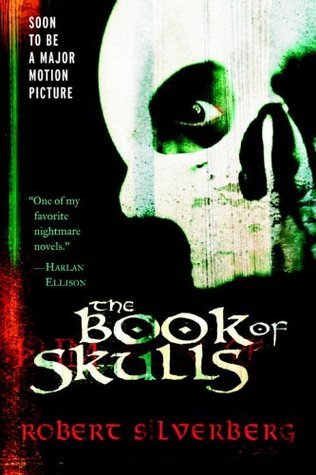 By ROBERT SILVERBERG (Del Rey; 1972/2004)
By ROBERT SILVERBERG (Del Rey; 1972/2004)
First and foremost, this novel is very much a product of its time. In its depiction of early 1970s youth culture, THE BOOK OF SKULLS is dense and not a little cynical, with a concentration on psychedelics and higher states of consciousness as well as a profoundly bleak trajectory germane to much Vietnam-era fiction. The subject? A search for immortality.
In its depiction of early 1970s youth culture, THE BOOK OF SKULLS is dense and not a little cynical, with a concentration on psychedelics and higher states of consciousness…
The searchers are four college pals, one of whom has uncovered and translated an ancient manuscript entitled THE BOOK OF SKULLS. It stipulates that immortality can be had, but only by a group of four, of whom two must apparently die. With the subsequent discovery of a House of Skulls located in the Arizona desert, our intrepid foursome decide to make a trek to the House from their New England home base in order to (hopefully) attain immortality…none of them fully facing up to the reality that, if the book is correct, two of them will lose their lives in the process!
This quest for immortality is presented as the ultimate hippie-esque happening, incorporating arcane rituals incomprehensible to straight America and plenty of amorous encounters along the way with several willing women (even though one of the foursome is openly gay and another closeted). All four protagonists are extremely well rendered and individual, each with distinct and appropriately complex reasons for making the trek to the House of Skulls. But the author errs, I feel, in presenting each chapter from the first person POVs of the four guys; this is problematic as, for starters, the voices all invariably sound the same.
In his afterword to THE BOOK OF SKULLS’ 2004 reissue, Robert Silverberg, being the noted science fiction scribe he is, spends a lot of time agonizing over whether this novel can be safely categorized as science fiction.
The four reach the eerie and foreboding House of Skulls about halfway through the book. There reside a band of possibly immortal monks who are part of an esoteric religious order with prehistoric, even Atlantean, roots. The monks do indeed claim to possess the key to immortality, as recorded in the BOS, but attaining it requires a lot of discipline and sacrifice. The monks force their would-be adherents to purify their bodies, have sex with a gaggle of nubile females in order to test their discipline, and, most harrowing of all, reveal their most awful secrets to one another—all in preparation for the two required deaths.
In his afterword to THE BOOK OF SKULLS’ 2004 reissue, Robert Silverberg, being the noted science fiction scribe he is, spends a lot of time agonizing over whether this novel can be safely categorized as science fiction. He concludes it can, what with its theme of immortality and the fact that it was nominated for the Hugo and Nebula awards. As for myself, I’d place the novel, with its near-Lovecraftian overtones and overall air of supernatural mystery, in a certain other, single word category, of which THE BOOK OF SKULLS can be counted as a powerful and impacting example.
